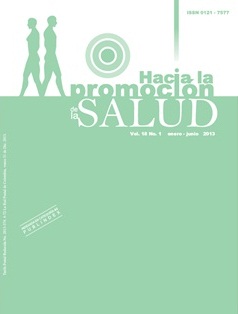Authors
Abstract
Objective: The objective of this work is the evaluation of the inter-rater reliability level of the ergonomic tool: Individual Risk Assessment. The inter-rater reliability of any assessment method values its capacity for providing similar assessment independently from the rater who uses it. Using the Individual Risk Assessment method different variables associated with: the back, arm, wrist and neck postures, and their interaction with the frequency of movement; their interaction with movement frequency; work rhythm and effort carried out, are evaluated Materials and Methods: Forty-two raters were trained to conduct the experiment, one half took a three-hours training and the rest a six-hours training. All of them assessed seven tasks representative of the Cuban industry. The training and the assessment of the videos were carried out between January and March 2011. From the statistical viewpoint, the reliability assessment was mainly based on the intra-class correlation coefficient calculation. Results: It is shown that while using the Individual Risk Assessment method the inter-rater reliability is acceptable, existing a higher agreement on the valuation given to dichotomy variables than the ones given to the ordinal variables. Conclusion: The need to improve the rater’s skills to assessment small body areas and to determine the frequency in which some tasks are carried out was confirmed. Higher levels of agreement between raters using this tool on practical environments are expected.
References
European Agency for Safety and Health at Work. Work-related musculoskeletal disorders in the EU – Facts and figures. Luxembourg: Publications Office of the European Union; 2010.
Takala EP. Systematic evaluation of observational methods assessing biomechanical exposures at work. Scandinavian Journal of Work, Environmental and Health, 2010;36(1):3-24.
Li G, Buckle P. Current techniques for assessing physical exposure to work-related musculoskeletal risks, with emphasis on posture-based methods. Ergonomics. 1999;42(5):674-95.
Bao S. Two posture analysis approaches and their application in a modified Rapid Upper Limb Assessment evaluation. Ergonomics. 2007;50(12):2118-36.
David G. Ergonomic methods for assessing exposure to risk factors for work-related musculoskeletal disorders. Occupational Medicine. 2005;55(3):190-99.
Rodríguez Y, Guevara-Velasco C. Empleo de los métodos ERIN y RULA en la evaluación ergonómica de puestos de trabajo. Ingeniería Industrial. 2011;32(1):19-27.
Rodríguez Y, Viña S, Montero R. ERIN: un método práctico de evaluación de riesgo de desórdenes músculo-esqueléticos de origen laboral. Paper presented at: III Congreso Latinoamericano de Ergonomía; 2010 Agosto 2-6; Río de Janeiro, Brasil.
Bao S, Howard N, Spielholz P, Silverstein B, Polissar N. Inter-rater Reliability of Posture Observations Human Factors. The Journal of the Human Factors and Ergonomics Society. 2009;51:292-309.
Stevens EM Jr, Vos GA, Stephens JP, Moore JS. Inter-rater reliability of the strain index. Journal of Occupational and Environmental Hygiene. 2004;11(1):745-51.
Xu X, Chang CC, Faber GS, Kingma I, Dennerlein JT. The validity and interrater reliability of video-based posture observation during asymmetric lifting tasks. Human Factors. 2011;53(4):371-82.
Burt S, Punnett L. Evaluation of interrater reliability for posture observations in a field study. Applied Ergonomics. 1999;30(2):121-35.
Shrout P, Fleiss J. Intraclass correlations: Uses in assessing rater reliability. Psychological Bulletin. 1979;86(2):420-28.
McGraw KO, Wong SP. Forming inferences about some intraclass correlation coefficients. Psychological Methods. 1996;1(1):30-46.
Siegel S, Castellan NJ. Nonparametric Statistics for the Behavioral Sciences. New York: McGrawHill; 1988.
David G, Woods V, Li G, Buckle P. The development of the Quick Exposure Check (QEC) for assessing exposure to risk factors for work-related musculoskeletal disorders. Applied ergonomics. 2008;39(1):57-69.
Parkab JK, Boyerb J, Tesslerb J, Caseybc J, Schemmb L, Goreb R, et al. Inter-rater reliability of PATH observations for assessment of ergonomic risk factors in hospital work. Ergonomics. 2009;52(7):820-29.
Toivonen R, Viikari-Juntura E, Ketola R. Interobserver repeatability and validity of an observation method to assess physical loads imposed on the upper extremities. Ergonomics. 2001;44(2):119-31.


 PDF (Español)
PDF (Español)
 FLIP
FLIP






















